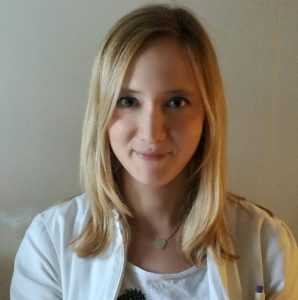Following Article 8 of the Ana Rukavina Foundation Statute and the Ordinance on the Conditions, Method and Procedure of Allocation of Professional Training Funds and Other Forms of Financial Aid (consolidated text), in September 2017, the Board of Trustees of the Ana Rukavina Foundation accepted the request of Dr. Zinaida Perić, hematology specialist requesting assistance with the funding of a two-month training course in acute leukemia and bone marrow transplantation program conducted at the Hematology Clinic at the Saint-Antoine Hospital in Paris.

Dr. Zinaida Perić
Before going on a two-month training course in Paris, we spoke with Dr. Perić:
1. Dr. Perić, for starters, tell us something about yourself, your career so far, and your education.
I graduated from medical school in 2007, and in 2008 I became a research fellow on the Leukemia and Bone Marrow Transplant project led by Professor Boris Labar. At the same time, I started working as a department physician at the Department of Bone Marrow Transplantation at University Hospital Centre Zagreb. In 2009 and 2011, I was trained in the field of allogeneic bone marrow transplantation at the University Hospital in Nantes, France, and did an experimental part of my doctoral dissertation there. I received my Ph.D. in 2014 from the Faculty of Medicine in Zagreb, and since 2016 I am a specialist in hematology at University Hospital Centre Zagreb. Since 2017, I am the secretary of the Transplant Complications Working Party of the European Society for Blood and Marrow Transplantation (EBMT) and co-chair of the Acute Lymphoblastic Leukemia Committee of the same society. In 2018 I became Assistant Professor at the Department of Internal Medicine, Faculty of Medicine, University of Zagreb.2. What motivated you to contact the Ana Rukavina Foundation with a request for funding your professional training?
Extraordinary kindness of Mrs. Marija Rukavina, many years the Foundation’s efforts to develop a transplant program in Croatia, and great experiences of my colleagues who have previously been trained in the same way.3. What do you expect from two months of professional training at Saint-Antoine Hospital in Paris (France)?
Professional training in the area of interest (and in my case, these are acute leukemias and allogeneic bone marrow transplants) is ideal at the moment when you are at the career level that I am currently in. This is a specialist internship period when you have some experience in the profession and with patients, which allow you to understand what segment you can advance in your environment, and when you are mature enough to adopt and implement new methods in everyday clinical practice.4. Who will be your mentor?
My mentor will be Professor Mohamad Mohty, Chairman of the Acute Leukemia Task Force and former President of the European Society for Blood and Marrow Transplantation, one of Europe’s leading experts in the field of acute leukemia transplantation and treatment.5. Tell us a bit more about the program itself, which is exactly will you be doing at Saint-Antoine Hospital for the next two months?
For the next two months, I will actively participate in all activities related to the Acute Leukemia and Bone Marrow Transplant Program, which is being conducted at the Hematology Clinic at St.Antoine University Hospital; from transplant coordination, expert meetings, acute care of patients during hospitalization and bone marrow transplantation, as well as subsequent outpatient care for early and late transplant complications, and, finally, new techniques and drugs used in the treatment of refractory and relapsing acute leukemias.6. How can this help to patients in Croatia when you get back?
Upon my return, I will endeavor to transfer the acquired knowledge and implement it into the transplant program, to improve the treatment and monitoring of our patients. I also hope to bring new knowledge in the treatment of patients suffering from so-called refractory hematological diseases, to which new drugs and the development of transplantation methods finally give hope for a cure.7. What do you think about this direction of the Ana Rukavina Foundation – support for the professional training for young doctors? How important is professional training for young doctors, especially hematologists?
Professional training is an absolute necessity and even more of a necessity in an area such as hematology, especially in methods that are developing as rapidly as bone marrow transplantation. There was no similar organization in Croatia before, and the Ana Rukavina Foundation provided young hematologists with a unique opportunity to gain new knowledge, thus improving care for hematology patients.8. And for the end, what is your message for everyone who follows the work of Ana Rukavina Foundation and what can they expect when you come back to Croatia?
They can expect great enthusiasm in trying to apply the newly acquired knowledge in everyday practice, and thus try to improve the care for patients who are treated in Croatia for severe hematological diseases.
We believe that Dr. Perić will gain valuable experience and knowledge in Paris and, upon returning to the patients in the Republic of Croatia, provide them with the highest quality treatment and hope for healing.